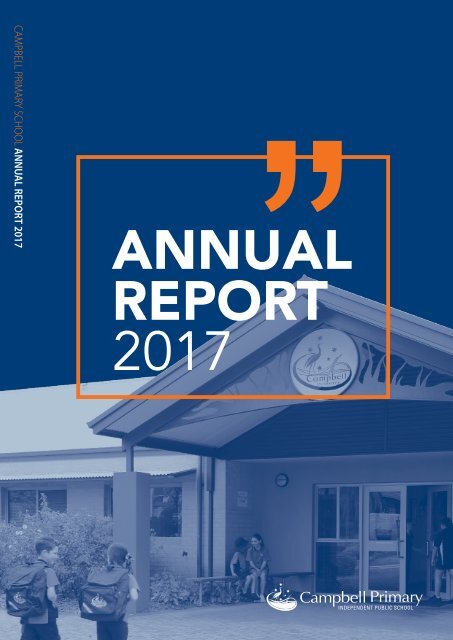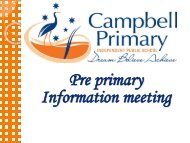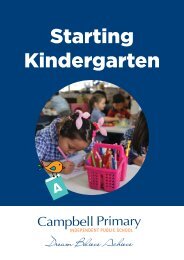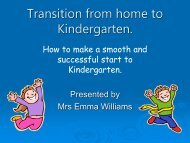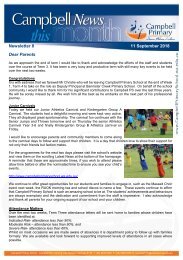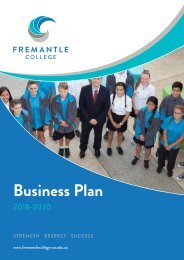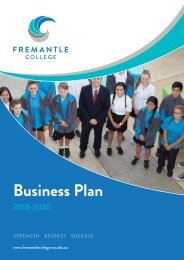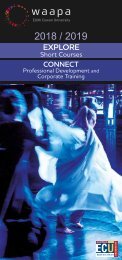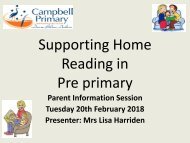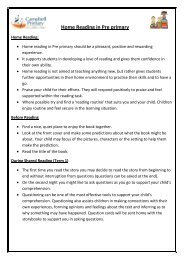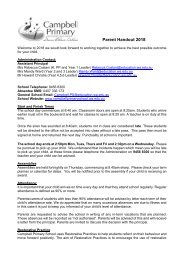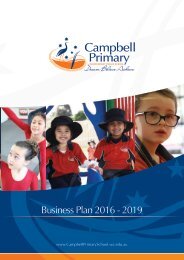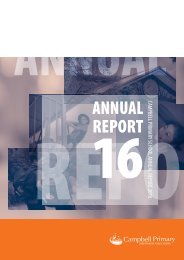CPS ANNUAL REPORT 2017
Create successful ePaper yourself
Turn your PDF publications into a flip-book with our unique Google optimized e-Paper software.
CAMPBELL PRIMARY SCHOOL <strong>ANNUAL</strong> <strong>REPORT</strong> <strong>2017</strong><br />
<strong>ANNUAL</strong><br />
<strong>REPORT</strong><br />
<strong>2017</strong><br />
1
(08) 9456 8300<br />
campbell.ps@education.wa.edu.au<br />
campbellprimaryschool.wa.edu.au<br />
Campbell Road, Canning Vale WA 6155
<strong>2017</strong> CAMPBELL PRIMARY<br />
SCHOOL <strong>ANNUAL</strong> <strong>REPORT</strong><br />
Contents<br />
4 Principal’s Report<br />
6 Business Plan<br />
8 Student Engagement<br />
12 Learning Area - Numeracy<br />
16 Learning Area - Literacy<br />
20 Learning Area - Science<br />
22 Learning Area - Humanities<br />
& Social Sciences<br />
24 Specialist Areas<br />
31 Partnerships With Parents<br />
Parent, Staff and Student Survey Information<br />
3
<strong>2017</strong> Campbell Primary School Annual Report<br />
PRINCIPAL’S <strong>REPORT</strong><br />
“<br />
Once again I am privileged with the task of<br />
presenting Campbell Primary School’s<br />
Annual report.<br />
It is an honour to lead this wonderful school.<br />
I extend my sincere thanks to the school<br />
administration, School Board, the Parents and<br />
Citizens Association and our highly dedicated<br />
staff for their tireless effort in enacting the<br />
school’s Business Plan (BP) and supporting our<br />
school throughout <strong>2017</strong>. Our School Board has<br />
achieved a great deal over the course of <strong>2017</strong> and<br />
this is a credit to all members and Mr Andrew Van<br />
Der Merwe – School Board Chair Person, who so<br />
ably leads our meetings.<br />
I would also like to thank the P&C President –<br />
Mrs Leonie Gurr for her commitment and drive in<br />
supporting numerous community and fundraising<br />
events over <strong>2017</strong>. Our P&C committee members<br />
again worked passionately with the community<br />
in order to raise enough funds to support school<br />
initiatives and programmes. I also would like to<br />
acknowledge the outstanding support provided<br />
to our school from parents and carers throughout<br />
the course of <strong>2017</strong>. I continue to be impressed with<br />
the strong sense of community that exists within<br />
our school and take pride in the achievements of<br />
both the staff and students.<br />
The Annual Report provides parents and the<br />
wider community with information about our<br />
school, the learning programs we provide and<br />
the performance of the student population. It<br />
also reviews our progress towards achieving our<br />
areas of focus and the targets set in our Business<br />
Plan 2016-2019*. The report also provides us<br />
with the opportunity to celebrate our successes<br />
and achievements including information about<br />
the future actions to be taken in 2018 to improve<br />
student achievement and further enhance the<br />
school’s effectiveness.<br />
It is important to note that the Annual Report is<br />
only one component of the total reporting process<br />
that the school undertakes. To contextualise the<br />
school’s purpose and its operations the Annual<br />
Report should be read in conjunction with other<br />
documents such as the Business Plan, newsletters,<br />
and information booklets, all of which can be<br />
located on the school’s webpage.<br />
The achievements of our students in <strong>2017</strong>, both<br />
in the academic and non-academic arena have<br />
been impressive with high quality teaching and<br />
learning programmes providing the cornerstone<br />
to such success. We have achieved many of our<br />
Business Plan objectives and I thank the staff<br />
for their commitment and unrelenting focus on<br />
student improvement.<br />
As an Independent Public Primary School we<br />
will continue to be highly responsive to both<br />
local and wider community perspectives. I look<br />
forward to 2018 and the further success we<br />
can achieve through a strong focus on working<br />
together and inspiring our students to dream,<br />
believe and achieve.<br />
4
OUR VALUES<br />
Campbell Primary School<br />
is committed to the Nine<br />
Values for Australian<br />
Schooling as identified in<br />
the National Framework<br />
for Values Education in<br />
Australian Schools.<br />
RESPECT<br />
Treat others with consideration and regard,<br />
respect another’s point of view.<br />
RESPONSIBILITY<br />
Be accountable for one’s own actions,<br />
resolve differences in constructive, nonviolent<br />
and peaceful ways, contribute to<br />
society and to civic life, take care of the<br />
environment<br />
INTEGRITY<br />
Act in accordance with principles of moral<br />
and ethical conduct, ensure consistency<br />
between words and deeds<br />
CARE AND COMPASSION<br />
Care for self and others<br />
HONESTY AND TRUSTWORTHINESS<br />
Be honest, sincere and seek the truth<br />
FAIR GO<br />
Pursue and protect the common good<br />
where all people are treated fairly for a<br />
just society<br />
DOING YOUR BEST<br />
Seek to accomplish something worthy<br />
and admirable, try hard, and pursue<br />
excellence<br />
UNDERSTANDING, TOLERANCE<br />
AND INCLUSION<br />
Be aware of others and their cultures,<br />
accept diversity within a democratic<br />
society, being included and including<br />
others<br />
FREEDOM<br />
Enjoy all the rights and privileges<br />
of Australian citizenship free from<br />
unnecessary interference or control,<br />
and stand up for the rights of others<br />
OUR VISION<br />
Campbell Primary School’s<br />
vision is to ensure that<br />
all students develop the<br />
knowledge, skills and<br />
confidence to achieve their<br />
individual potential and to<br />
contribute to society, which<br />
will establish the foundation<br />
for lifelong learning.<br />
5
<strong>2017</strong> Campbell Primary School Annual Report<br />
SCHOOL BUSINESS PLAN<br />
SCHOOL CONTEXT<br />
The School commenced the <strong>2017</strong> year with 777 enrolments from Kindergarten to Year 6.<br />
Staff are merit selected and are committed to the collaborative culture that exists within the school.<br />
In <strong>2017</strong>, 50 teaching staff and 29 support staff were employed. All teaching staff are registered with<br />
the Western Australian Teacher Registration Board and have appropriate teaching qualifications.<br />
Our teaching staff are highly competent and are committed to lifelong learning.<br />
The School provides a high quality learning environment where student learning is dynamic,<br />
motivating and meaningful. The committed and caring staff work closely with families to provide<br />
a well-rounded education for our students. They have fully embraced the Western Australian<br />
curriculum and the latest research based approaches implemented within the school to improve<br />
student learning. I continue to be inspired by the highly professional and collaborative culture that<br />
exists here.<br />
English as an Additional Language/Dialect (EALD)<br />
The diversity in our community is celebrated<br />
and embraced by all. Approximately 40% of<br />
our student population are from non-English<br />
speaking backgrounds. The most dominant<br />
language backgrounds include Chinese and<br />
Indian languages. To support students to<br />
develop their home language we have after<br />
school Hindi classes available. The School<br />
Board also initiated a Multi-cultural community<br />
group in order to support new families into our<br />
school. This group will provide support and<br />
offer social events throughout 2018.<br />
The school supports our EALD students<br />
through a specialist EALD teacher, ethnic<br />
assistant and a bilingual front office staff<br />
member. Our ethnic assistant and front office<br />
staff member greatly support our students and<br />
families through interpreting and translating.<br />
Full-time equivalent enrolments: 729<br />
Indigenous<br />
students<br />
Language<br />
background<br />
other than<br />
English<br />
1% 41%<br />
6
“Thank you to all staff<br />
that have made our<br />
family’s journey a<br />
fantastic learning place<br />
for the last 6 years with<br />
both of my children. “<br />
7
<strong>2017</strong> Campbell Primary School Annual Report<br />
STUDENT ENGAGEMENT,<br />
BEHAVIOUR AND ATTENDANCE<br />
ENROLMENT TRENDS<br />
As mentioned, in <strong>2017</strong> we had 777<br />
students enrolled from Kindergarten to<br />
Year 6. This is 79 students less than the<br />
previous year. This can be attributed<br />
to a reduction of students enrolled as<br />
Kindergarten overflow students. These<br />
students are now accommodated at<br />
their local intake schools. From 2018<br />
we will no longer be an overflow site<br />
for Kindergarten students. We therefore<br />
expect that due to this, our numbers will<br />
again slightly decline going in to 2018.<br />
Despite reduced numbers we still<br />
experience enrolment pressure and<br />
continue to accommodate families only<br />
from our local intake area.<br />
Campbell PS provides quality of<br />
teaching and learning<br />
Excellent<br />
Above average<br />
Average<br />
Below average<br />
Unable to<br />
comment<br />
BUSINESS PLAN TARGET:<br />
Exit surveys reflect high levels<br />
of satisfaction with the school<br />
Each year families leaving our school<br />
are invited to complete an exit survey.<br />
In <strong>2017</strong> we had some 57 families that<br />
left the school and responded to this<br />
survey. Of the 57 families, 11 of the<br />
respondents moved to another suburb,<br />
1 went to a private school and the other<br />
35 respondents were from families with<br />
students that graduated from Year 6.<br />
The exit surveys once again indicated<br />
that families that were very happy with<br />
the school and the education it provides.<br />
How would you describe your overall<br />
experience at Campbell PS<br />
Excellent<br />
Above average<br />
Average<br />
Below average<br />
Unable to<br />
comment<br />
8
STUDENTS AT EDUCATIONAL RISK<br />
Campbell Primary School has a strong ongoing<br />
commitment to the support of all students<br />
identified as being at risk, both academically<br />
and within the social and emotional context.<br />
This commitment is supported through a<br />
comprehensive identification process that uses<br />
academic data, teacher judgments and ongoing<br />
social emotional checklists to monitor the<br />
wellbeing of our students.<br />
Recommendations for 2018<br />
■■<br />
■■<br />
Further development of a Response to<br />
Intervention model that clearly outlines the<br />
processes and requirements for each level<br />
of intervention; and,<br />
Implementation of targeted strategies to<br />
support areas of concern as identified in<br />
the Social and Emotional Wellbeing survey<br />
completed by all students in Years 3 to 6.<br />
Students are supported through a wide range<br />
of interventions including small group and<br />
individual learning plans, behaviour plans,<br />
the use of Highway Heroes as a core teaching<br />
strategy and referrals to the Students at<br />
Educational Risk (SAER) team, to external<br />
medical providers, to the Parkerville School<br />
Based Support Counsellor and to our school<br />
chaplain.<br />
Successes in <strong>2017</strong><br />
■■<br />
■■<br />
■■<br />
■■<br />
■■<br />
Continuation of the Learning Support<br />
Coordinator role;<br />
A School Chaplain was appointed;<br />
Evidence of significant growth for students<br />
involved in the MiniLit Early intervention<br />
programme;<br />
The ongoing streamlining of referral<br />
processes, prompt and targeted<br />
intervention by the SAER team to support<br />
teachers in the provision of appropriate<br />
programs for students, provision of short<br />
term counselling for students experiencing<br />
difficulty in managing their emotions or<br />
dealing with stressful life situations, onward<br />
referrals to outside agencies for further<br />
intervention and support for students<br />
and families through the School Based<br />
Chaplaincy Service; and,<br />
Highly positive results in the KidsMatter<br />
Emotional Wellbeing Survey showing that<br />
students have very positive responses<br />
across the domains of liking school, feeling<br />
safe, friends, social skills and me.<br />
9
<strong>2017</strong> Campbell Primary School Annual Report<br />
HEALTH AND WELLBEING<br />
We remain committed to ensuring all students<br />
and the school community feel accepted,<br />
nurtured, valued, respected and included,<br />
consistent with the Nine Values for Australian<br />
Schooling. Our Health and Wellbeing program<br />
promotes mental health, through KidsMatter<br />
and resiliency through the ‘Highway Heroes’<br />
program.<br />
We assessed the success of our Health and<br />
Wellbeing program through conducting the<br />
KidsMatter Survey PP-Year 2 and the Year 3-6<br />
Australian Council for Education Risk (ACER)<br />
Social Emotional Survey.<br />
Successes in <strong>2017</strong>:<br />
■■<br />
■■<br />
■■<br />
Staff undertaking KidsMatter refresher<br />
components 1-3 and commencing<br />
professional learning in component 4;<br />
A Health Teaching Guide scope and<br />
sequence document which aligned to<br />
the Western Australian Curriculum was<br />
developed for staff; and,<br />
Partnerships with Parents sessions were<br />
held to engage the wider community with<br />
our ‘Highway Heroes’ program and cyber<br />
safety.<br />
Recommendations for 2018<br />
■■<br />
■■<br />
Social and Emotional Learning survey data<br />
is used to target set for 2018.<br />
Teaching staff to finish Component 4-of<br />
KidsMatter to obtain full accreditation as a<br />
KidsMatter school.<br />
Business Plan Targets<br />
■■<br />
Data collected from KidsMatter survey<br />
PP-Year 2 is positive. (achieved)<br />
KidsMatter PP-Year 2 survey showed all scores<br />
at or above 89% positive<br />
■■<br />
Year 3 to 6 ACER Social Emotional Survey<br />
data is positive with data used to identify<br />
target setting where required. (achieved)<br />
The Year 3-6 ACER Social Emotional survey data<br />
was positive overall with student responses in<br />
the social domain stronger than all schools.<br />
ATTENDANCE<br />
Our overall attendance rate for <strong>2017</strong> remained<br />
high at 94.3%, this is slightly higher than in 2016.<br />
Business Plan Targets<br />
■■<br />
■■<br />
Steadily improve regular attendance for<br />
Pre-primary to Year 3 to be 84% or above<br />
by 2018.<br />
Reduce percentage of unexplained<br />
absences.<br />
Regular attendance has continued to improve<br />
across year levels and we are very close<br />
to meeting our BP Target of 84% regular<br />
attendance for our Pre-primary to Year 3 cohort.<br />
The regular attendance rate for <strong>2017</strong> was<br />
86.8%. Through a strong focus on attendance<br />
we have seen improvement for our target<br />
groups. There has been an improvement in<br />
regular attendance for all years except in Year 1<br />
with 83% regular attendance.<br />
Through a rigorous process of monitoring<br />
unauthorised absences, we have also been<br />
successful in achieving the BP target of<br />
reducing the percentage of unauthorised<br />
absences.<br />
Behaviour Data<br />
With the revised and reviewed Behaviour<br />
Management in Schools policy we have<br />
experienced a greater level of consistency<br />
in behaviour management and recording<br />
of behaviours across the school. In <strong>2017</strong><br />
the percentage of students that received a<br />
suspension continued to be very low.<br />
Continued implementation of KidsMatter<br />
initiatives and the Highway Heroes programme<br />
has also greatly enhanced behaviour and<br />
supported a consistent language across the<br />
school.<br />
10
Collection Period 2014 Sem 2 2015 Sem 2 2016 Sem 2 <strong>2017</strong> Sem 2<br />
Unauthorised Absence 44.2% 36.5% 34.4% 26.2%<br />
It is pleasing to note a decrease in the percentage of students that are at indicated, moderate and<br />
severe risk in attendance.<br />
Attendance Category<br />
Regular<br />
At Risk<br />
Indicated Moderate Severe<br />
2015 84.0% 12.9% 2.8% 0.1%<br />
2016 81.8% 14.5% 3.0% 0.5%<br />
<strong>2017</strong> 86.8% 10.7% 2.3% 0.3%<br />
Like Schools <strong>2017</strong> 86.0% 11.1% 2.3% 0.6%<br />
WA Public Schools 77.0% 15.0% 6.0% 2.0%<br />
“If there is a scale<br />
above excellent<br />
we would happily<br />
choose it.”<br />
11
<strong>2017</strong> Campbell Primary School Annual Report<br />
EXCELLENCE IN STUDENT ACHIEVEMENT<br />
Early Childhood<br />
The Early Years Classrooms have continued to provide excellence in learning across all areas of the<br />
Early Years Learning Framework and Western Australian Curriculum. Teachers work collaboratively<br />
to provide a curriculum that embraces intentional play based learning, explicit skills teaching and<br />
exposure to a wide variety of engaging learning experiences. Teachers within the early years have<br />
delivered a consistently high standard of outcomes across a range of areas. This is also evidenced in<br />
our meeting of 5 out of the 7 National Quality Standards, which was set as a Business Plan Target.<br />
The National Quality Standards provide an assessment framework for Kindergarten to Year 2. Our<br />
school based assessment audit against the standards was very positive with all 5 of the Standards<br />
set as targets achieved.<br />
Quality Area 1: Educational Program and Practice<br />
Quality Area 2: Children’s health and safety<br />
Quality Area 5 : Relationships with children<br />
Quality Area 6: Collaborative partnerships with parents<br />
Quality Area 7: Leadership and service management<br />
Notable improvements were also evident in Quality Area 4 – Staffing Arrangements and<br />
Quality Area 3: Physical Environment<br />
In <strong>2017</strong> the Kindergarten Assessment Tool was introduced with targets set for improvement in<br />
phonological achievement.<br />
50%<br />
45%<br />
40%<br />
35%<br />
30%<br />
25%<br />
20%<br />
15%<br />
10%<br />
5%<br />
0%<br />
>75% 50-74% 25 - 49% 25%<br />
Target: Increase the percentage of<br />
students achieving 75% or more in<br />
their final assessment. (achieved)<br />
In 2016, 24% of students scored 75% or more. In <strong>2017</strong> 47% of students scored 75% or more, an increase of 23%.<br />
12
On–Entry Assessment<br />
Future Recommendations<br />
Each year our Pre-primary (PP) students<br />
complete the Literacy and Numeracy On-Entry<br />
assessments. This assessment tool identifies<br />
the literacy and numeracy capabilities<br />
students enter PP with and provides valuable<br />
information for us as a school to support our<br />
planning.<br />
2016 to 2019 Business Plan Targets<br />
■■<br />
■■<br />
To raise the percentage of students who<br />
are entering PP with a score in Literacy in<br />
excess of 0.5VEL.<br />
To continue to improve the number of<br />
students who achieve 1.0 VEL in Numeracy<br />
at the beginning of the year and to extend<br />
students further throughout their PP year.<br />
■■<br />
■■<br />
■■<br />
Continued improvement in On Entry results<br />
in both Literacy and Numeracy;<br />
An ongoing commitment to guided reading<br />
resulting in positive literacy gains for all<br />
students; and,<br />
Expansion of the MiniLit program to include<br />
PP, Year 1 and Year 2 students who have<br />
been identified as requiring additional<br />
literacy support.<br />
Total Literacy Score<br />
Numeracy<br />
2016 <strong>2017</strong> 2016 <strong>2017</strong><br />
49% >= 0.5 VEL 64%>= 0.5 VEL 50%>=1.0 VEL 57%>=1.0 VEL<br />
15% improvement 7% improvement<br />
13
<strong>2017</strong> Campbell Primary School Annual Report<br />
LEARNING AREA:<br />
NUMERACY<br />
Numeracy remained a focus area in <strong>2017</strong><br />
with the adoption of the iStar pedagogical<br />
model to achieve a whole school connected<br />
approach to the teaching of Mathematics.<br />
Key strategies to support student<br />
improvement in Numeracy included:<br />
■■<br />
■■<br />
The implementation of the iStar connected<br />
practice model to develop shared<br />
pedagogical practices in the teaching<br />
of Mathematics across the school. This<br />
includes a whole school approach towards<br />
adopting explicit learning practices, such as<br />
explicit, differentiated learning intentions<br />
and a common methodological approach<br />
to structuring individual lessons and units<br />
of lessons.<br />
The consolidation of initiatives within<br />
classrooms to facilitate differentiation<br />
and provide opportunities to enrich and<br />
accelerate learning, including:<br />
■■<br />
■■<br />
■■<br />
purchase of MathsOnline, which has<br />
facilitated self-paced online individual<br />
learning and facilitated the differentiation<br />
of the curriculum within classrooms and<br />
in case management processes;<br />
the consolidation and promotion of<br />
computer programming in classrooms<br />
to enrich the Mathematics curriculum,<br />
including holding the ‘Hour of Code’<br />
during National Numeracy and Literacy<br />
week; and,<br />
continuing to support and promote<br />
Numero as a whole school strategy to<br />
improve student fluency and reasoning<br />
in Mathematics through: upskilling<br />
■■<br />
■■<br />
teachers, the Partnerships with Parents<br />
program, open classrooms and student<br />
engagement in Numero competitions.<br />
Target setting for individuals and groups<br />
of students based on an examination of<br />
school and system data in numeracy;<br />
Implementation of Case Management for<br />
identified students.<br />
Future Recommendations:<br />
■■<br />
■■<br />
■■<br />
■■<br />
Complement the adoption of the iStar<br />
pedagogical model through:<br />
■■<br />
■■<br />
■■<br />
the Introduction of PR1ME Mathematics<br />
resource books and the Concrete –<br />
Pictorial-Abstract approach to support<br />
explicit teaching;<br />
providing staff with ongoing<br />
professional learning around the<br />
introduction of the iStar model and<br />
PR1ME Mathematics text books; and,<br />
the introduction of a Mathematics<br />
vocabulary scope and sequence to<br />
improve Mathematical literacy.<br />
Use target setting documents to support<br />
planning for student improvement in <strong>2017</strong><br />
and 2018.<br />
Provide training and assistance to new and<br />
current teachers to continue up-skilling<br />
them in Numero.<br />
Implement a whole school problem solving<br />
and mental strategies program, based on<br />
the PR1ME bar method problem solving<br />
strategy<br />
14
2016-2019 Business Plan Numeracy Targets<br />
■■<br />
High levels of Year 3 achievement in NAPLAN are sustained into Year 5; (achieved)<br />
In 2015 – 65% of Year 3 students achieved above National Mean<br />
In <strong>2017</strong> – 68% of Year 5 students achieved above the National Mean<br />
■■<br />
■■<br />
■■<br />
Maintain or increase the percentage of Year 5 students achieving in the top 20% of the state in<br />
NAPLAN Numeracy to be above 30% aspiring to be above 40% in <strong>2017</strong>; (not achieved - 30% )<br />
Year 3 to 5 data to remain in the higher achievement quadrant when compared to like schools,<br />
aspiring to achieve in the higher achievement and progress quadrant; (achieved)<br />
Maintain positive results in Year 3 and 5 for non- English speaking background subgroups when<br />
compared to like schools and National means; (achieved). The School mean for Year 3 and 5<br />
EAL/D student achievement is 530, remaining above the state, national and like school means.<br />
NAPLAN <strong>2017</strong> - Numeracy Results<br />
The tables below describe the students’ performance in Mathematics from the <strong>2017</strong> NAPLAN<br />
testing. Average scores are compared with Like Schools, WA and Australian averages.<br />
Year 3 Year School<br />
(mean)<br />
Like<br />
Schools<br />
Western<br />
Australian<br />
Australian<br />
Difference Between<br />
School and Like Schools<br />
<strong>2017</strong> 416 426 400 409 -10<br />
2016 418 415 393 402 +3<br />
2015 431 408 387 398 +23<br />
2014 430 411 390 402 +29<br />
Year 5 Year School<br />
(mean)<br />
Like<br />
Schools<br />
Western<br />
Australian<br />
Australian<br />
Difference Between<br />
School and Like Schools<br />
<strong>2017</strong> 515 511 486 494 +4<br />
2016 511 505 483 493 +6<br />
2015 519 511 481 492 +8<br />
2014 515 498 476 486 +17<br />
The Year 5 cohort continue to achieve above Like Schools and increased their percentage within<br />
the top 20% of the distribution; however, the Year 3 cohort has dropped below Like Schools in<br />
<strong>2017</strong> and there is a need to continue to increase the percentage of Year 3 students achieving in the<br />
top 20% of the distribution. We have also noted a decrease in the number of students achieving<br />
in the bottom 20% of the Year 5 cohort. To support student improvement and address areas of<br />
concern we will continue a case management approach into 2018, consolidate the adoption of the<br />
iStar pedagogical model and continue to use data to set targets for individual students and groups<br />
of students within cohorts.<br />
15
<strong>2017</strong> Campbell Primary School Annual Report<br />
LEARNING AREA:<br />
LITERACY<br />
Literacy continues to be a focus area, with<br />
Reading remaining a whole school priority in<br />
<strong>2017</strong>. There is pleasing evidence indicating<br />
that our strategies are having a significant<br />
impact on literacy approaches across the<br />
school, such as increasing the percentage of<br />
students achieving Year level Reading targets<br />
across all year levels. While the achievement<br />
of BP targets have not all been met in <strong>2017</strong>,<br />
we remain positive that we will see an<br />
upward shift in our 2018/2019 data once the<br />
newly adopted strategies have become fully<br />
embedded across the whole school.<br />
Key strategies to support our literacy focus<br />
include:<br />
■■<br />
■■<br />
■■<br />
■■<br />
■■<br />
■■<br />
■■<br />
The implementation of the iStar connected<br />
practice model to develop shared<br />
pedagogical practices. This includes a<br />
whole school approach towards adopting<br />
explicit learning practices, such as explicit,<br />
differentiated learning intentions and a<br />
common methodological approach to<br />
structuring individual lessons and units of<br />
lessons.<br />
A continued focus on implementing the<br />
Western Australian Curriculum;<br />
Staff commitment to the Whole School<br />
English Plan;<br />
Collaborative staff planning and assessment<br />
activities;<br />
EAL/D support;<br />
Target setting for individuals and groups of<br />
students based on an examination of school<br />
and system data in literacy; and,<br />
Peer observation processes to support and<br />
promote best practice.<br />
Key strategies to support improvements in<br />
Reading have included:<br />
■■<br />
■■<br />
■■<br />
■■<br />
■■<br />
■■<br />
■■<br />
■■<br />
Developing a consistent approach to the<br />
literacy block, with a specific focus on whole<br />
school approaches to Guided Reading;<br />
The implementation of First Steps Reading<br />
strategies through professional learning<br />
supporting the development of a whole<br />
school approach to Guided Reading;<br />
Adopting online learning, such as the<br />
integration of Literacy Pro and Read<br />
Theory into classrooms to provide a highly<br />
differentiated teaching and learning<br />
environment;<br />
The consolidation of early intervention<br />
programs, such as MiniLit and Reading Eggs;<br />
Implementing miscue analysis/running<br />
records for Year 3-6 students at academic risk;<br />
Consolidating the Year 3 -6 support-a-reader<br />
program;<br />
Continuing the case management<br />
programme with a focus on Reading; and,<br />
Providing enhanced opportunities for<br />
students and the community to engage with<br />
Reading, such as promoting the Holiday<br />
Reading Challenge and offering Partnerships<br />
with Parents sessions.<br />
Future Recommendations:<br />
■■<br />
Our data is demonstrating that key strategies<br />
are beginning to result in student improvement<br />
and that we are working towards meeting<br />
our Business Plan targets in 2018/2019. It<br />
is recommended these key strategies be<br />
consolidated in 2018 and target setting<br />
documents are used to support planning for<br />
continued student improvement in 2018/2019.<br />
16
■■<br />
It is further recommended that the iStar<br />
pedagogical model, which was introduced<br />
to teachers and applied in the Numeracy<br />
learning area in <strong>2017</strong>, be expanded to<br />
complement connected practice initiatives in<br />
Literacy, such as Guided Reading.<br />
■■<br />
Maintain or increase the percentage of Year<br />
5 students achieving in the top 20% of the<br />
state in NAPLAN Reading and Writing to be<br />
above 30%. (achieved in writing only)<br />
Reading<br />
Writing<br />
2016-2019 Business Plan Literacy Targets<br />
■■<br />
■■<br />
■■<br />
Increase the percentage of Year 3 students<br />
achieving in the top 20% of the state in<br />
NAPLAN reading to be above 35%. (not<br />
achieved – 20%)<br />
High levels of Year 3 achievement in NAPLAN<br />
are sustained into Year 5; (not achieved)<br />
Maintain positive results in Year 3 and 5 for<br />
ELA/D sub-group when compared to like<br />
schools, state and national means. (achieved)<br />
■■<br />
2016 - 25% 2016 - 33%<br />
<strong>2017</strong> - 20% <strong>2017</strong> - 35%<br />
The Year 5 NAPLAN results reflect<br />
consistency across domains tested in terms<br />
of achievement and progress with reading<br />
shifting to higher achievement quadrant by<br />
<strong>2017</strong>. (not achieved)<br />
17
<strong>2017</strong> Campbell Primary School Annual Report<br />
NAPLAN <strong>2017</strong> – LITERACY RESULTS<br />
The tables below describe the students’ performance in Literacy from the <strong>2017</strong> NAPLAN testing.<br />
Average scores are compared with Like Schools, WA and Australian averages.<br />
Once again our results for NAPLAN testing in Year 3 and 5 have been pleasing. The table below<br />
summarises our results. In Year 3 we achieved above the Like School’s mean in all Literacy areas<br />
tested. In Year 5 we achieved above like schools in all areas except in reading. Both year 3 and 5<br />
achieved above Western Australian and Australian mean in all areas tested.<br />
It is particularly pleasing to note that in Year 3 we have reduced the percentage of students at<br />
or below National Minimum Standard in all areas tested. There were also no students below<br />
benchmark in reading in <strong>2017</strong>. In Year 5 we have had a similar result with a reduced percentage of<br />
students at or below National Minimum Standard in all areas except Grammar and Punctuation.<br />
NAPLAN <strong>2017</strong> - Reading<br />
Year 3 Year School<br />
(mean)<br />
Like<br />
Schools<br />
Western<br />
Australian<br />
Australian<br />
Difference Between<br />
School and Like Schools<br />
<strong>2017</strong> 448 440 420 431 +8<br />
2016 429 435 416 426 -6<br />
2015 445 435 413 426 +10<br />
2014 436 431 407 419 +5<br />
Year 5 Year School<br />
(mean)<br />
NAPLAN <strong>2017</strong> - Writing<br />
Year 3 Year School<br />
(mean)<br />
Like<br />
Schools<br />
Like<br />
Schools<br />
Western<br />
Australian<br />
Western<br />
Australian<br />
Australian<br />
Australian<br />
Difference Between<br />
School and Like Schools<br />
<strong>2017</strong> 518 522 499 506 -4<br />
2016 515 509 495 502 +6<br />
2015 506 509 489 498 -3<br />
2014 504 508 492 501 -4<br />
Difference Between School<br />
and Like Schools<br />
<strong>2017</strong> 433 427 410 414 +6<br />
2016 431 427 414 421 +4<br />
2015 452 425 408 416 +27<br />
2014 444 411 397 402 +33<br />
18
Year 5 Year School<br />
(mean)<br />
Year 3 Year School<br />
(mean)<br />
Like<br />
Schools<br />
Western<br />
Australian<br />
Australian<br />
Difference Between School<br />
and Like Schools<br />
<strong>2017</strong> 462 456 429 439 +6<br />
2016 440 450 425 436 -10<br />
2015 471 448 424 433 +23<br />
2014 455 436 413 426 +19<br />
Year 3 Year School<br />
(mean)<br />
Like<br />
Schools<br />
Like<br />
Schools<br />
Western<br />
Australian<br />
Western<br />
Australian<br />
Australian<br />
Australian<br />
Difference Between School<br />
and Like Schools<br />
<strong>2017</strong> 504 491 469 473 +13<br />
2016 503 482 470 475 +21<br />
2015 494 493 471 478 +1<br />
2014 502 478 465 468 +24<br />
NAPLAN <strong>2017</strong> - Grammar and Punctuation<br />
Year 5 Year School<br />
(mean)<br />
Like<br />
Schools<br />
Western<br />
Australian<br />
Australian<br />
Difference Between School<br />
and Like Schools<br />
<strong>2017</strong> 534 524 492 499 +10<br />
2016 520 516 499 505 +4<br />
2015 529 521 496 504 +8<br />
2014 527 511 495 504 +16<br />
NAPLAN <strong>2017</strong> - Spelling<br />
Difference Between School<br />
and Like Schools<br />
<strong>2017</strong> 442 423 409 416 +19<br />
2016 438 431 412 420 +7<br />
2015 446 421 400 409 +25<br />
2014 445 422 403 412 +23<br />
Year 5 Year School<br />
(mean)<br />
Like<br />
Schools<br />
Western<br />
Australian<br />
Australian<br />
Difference Between School<br />
and Like Schools<br />
<strong>2017</strong> 559 519 498 501 +40<br />
2016 536 505 488 493 +31<br />
2015 523 512 493 498 +11<br />
2014 525 500 492 498 +25<br />
19
<strong>2017</strong> Campbell Primary School Annual Report<br />
LEARNING AREA:<br />
SCIENCE<br />
We continued to deliver a curriculum based,<br />
scientifically researched program with inquirybased<br />
investigations linked directly to the<br />
science understanding being taught. The<br />
Science program draws upon relationships<br />
with external organisations and the wider<br />
academic community to create an engaging<br />
and rigorous program which is highly<br />
differentiated to cater for all students.<br />
The Science program joined with Canning<br />
Vale College and their partner school, Newton<br />
Moore Senior High School to help develop<br />
a Science Technology Engineering and<br />
Mathematics (STEM), general capabilities<br />
scope and sequence document to enhance the<br />
integration of STEM across different phases of<br />
learning. We have also fostered and supported<br />
a network of primary Science specialist<br />
teachers to create standardised Science<br />
assessments addressing the requirements of<br />
the Western Australian Curriculum.<br />
In <strong>2017</strong> the School hosted a ‘Science Alive’<br />
incursion, which complemented the senior<br />
student program around electricity and a<br />
‘Chemical Science’ incursion during National<br />
Science week to promote Science and<br />
increased understanding and engagement.<br />
Year 6 students participated in a series<br />
of excursions to Canning Vale College to<br />
experience a secondary school science<br />
environment, and new science investigation<br />
techniques under the supervision of secondary<br />
school teachers.<br />
20
Achievements for <strong>2017</strong><br />
Recommendations in 2018:<br />
■■<br />
■■<br />
■■<br />
Maintain and enhance the profile of Science<br />
within the school through creating incursion<br />
opportunities around National Science<br />
Week and continue providing Science<br />
enrichment activities through collaboration<br />
with Canning Vale College.<br />
Continue to collaborate with the established<br />
Primary Science Specialist Network to<br />
develop assessment tasks and marking<br />
rubrics, to both determine any student<br />
global weakness and to monitor progress in<br />
Science. This data will inform pedagogy and<br />
assessment across the network schools.<br />
Contact and liaise with Secondary schools<br />
promoting STEM programs, to establish<br />
entry requirements for students and<br />
scholarship opportunities. Present a<br />
‘Partnerships with Parents’ information<br />
session in 2018 to communicate this<br />
information to the broader school<br />
community.<br />
Sustainability<br />
Sustainability is the ability to continue a<br />
defined behaviour indefinitely.<br />
The schoo’s Business Plan gained momentum<br />
as the <strong>2017</strong> year progressed.<br />
■■<br />
■■<br />
■■<br />
■■<br />
■■<br />
■■<br />
The School was acknowledged for their ten<br />
year Waterwise status;<br />
Sustainability was added as an area of study<br />
to the Year 6 enrichment classes;<br />
Students from the enrichment class entered<br />
the Royal Show and the local council’s<br />
‘Switch Your Thinking’ promotion;<br />
An audit on waste was completed;<br />
A Kindergarten class used the Year of<br />
Sustainable Development in Tourism theme<br />
to complete tasks depicting holidaying in<br />
Western Australia and their work is entered<br />
into the School’s Display Competition at the<br />
local Canning Show.<br />
An annual whole school environmental<br />
project was held to reinforce Campbell’s 10<br />
year Waterwise standing during <strong>2017</strong>.<br />
All families were asked to collect and store<br />
some precious water from a place that was<br />
important to them and justify their selections.<br />
A display was made showing water from a<br />
variety of places and that water is used for<br />
many necessary functions and also provides<br />
enjoyment in our lives. The categories of water<br />
represented was phenomenal and a huge<br />
display was assembled for our community to<br />
view.<br />
Future Recommendations<br />
The recommendation for 2018 is to build further<br />
on the visibility of sustainable practice within our<br />
school. This has potential to improve evidence<br />
of early year’s environmental responsibility<br />
and to embed sustainable practice for National<br />
Quality Standard Three accreditation.<br />
Recommendations<br />
■■<br />
■■<br />
Build further on the visibility of sustainable<br />
practice.<br />
The 2018 annual whole school<br />
environmental project is to include a day of<br />
the week where students are encouraged to<br />
bring a lunch that has no waste packaging.<br />
21
<strong>2017</strong> Campbell Primary School Annual Report<br />
LEARNING AREA:<br />
HUMANITIES AND<br />
SOCIAL SCIENCES<br />
A key focus in Humanities and Social Sciences<br />
(HaSS) in <strong>2017</strong>, was to consolidate the<br />
implementation of Phase 2 Western Australian<br />
Curriculum with teaching in History, Geography,<br />
Civics and Citizenship and Economics and<br />
Business delivered in classrooms. Teachers have<br />
been supported in the delivery and assessment<br />
of their HASS programs through moderation<br />
tasks in History and Geography.<br />
The HaSS team has provided professional<br />
learning for staff on addressing the Aboriginal<br />
Cultural Standards Framework and supported<br />
the integration of indigenous and broader<br />
HaSS concepts within the curriculum through<br />
the purchase of new resources, such as<br />
guided reading books. The HaSS team has<br />
also completed a successful application for a<br />
Partnership, Learning, Acceptance and Sharing<br />
(PALS) grant, which supported the purchase of<br />
more HaSS reading resources.<br />
Recommendations for 2018:<br />
■■<br />
■■<br />
■■<br />
Further embed understanding of the<br />
Aboriginal Cultural Standards Framework<br />
through staff completing the Cultural<br />
Awareness program;<br />
Continue to purchase guided reading books<br />
to integrate HaSS concepts within the<br />
broader curriculum; and,<br />
Support the implementation of the HaSS<br />
curriculum with further moderation<br />
opportunities for staff.<br />
22
“My child’s emotional,<br />
behavioural and<br />
educational needs<br />
have been more than<br />
adequately met by the<br />
very patient and brilliant<br />
teachers at Campbell<br />
Primary School. I am<br />
very sad that it is now<br />
an end of an era for our<br />
family. “<br />
23
<strong>2017</strong> Campbell Primary School Annual Report<br />
LEARNING AREA:<br />
SPECIALIST AREAS<br />
THE ARTS<br />
The School Arts’ Strategic Plan continues to<br />
be implemented across Music, Visual Arts and<br />
Dance. The Plan provides clear links between the<br />
Arts specialist programs, within which teachers<br />
work collaboratively to provide a rich learning<br />
environment allowing students at all ability<br />
levels opportunities to develop skills in creative<br />
problem solving, resiliency, communication and<br />
self-expression. The Arts features prominently<br />
in our senior student curriculum enrichment<br />
program, where all students have access to units<br />
in Visual Art, Drama, Dance and Music.<br />
The teachers employ the plan and SCSA’s Rules<br />
of Engagement for the Arts to deliver their<br />
programs. The plan was further developed<br />
in <strong>2017</strong> to provide students with a more<br />
connected experience when exploring the<br />
Arts and increased opportunities to apply<br />
learning from one Arts learning area to another.<br />
Implementation of the Strategic Plan was<br />
supported through the development of several<br />
common moderation tasks, providing specialist<br />
teachers with the opportunity to collaboratively<br />
reflect on their teaching and assessment.<br />
Our Arts program seeks to involve the wider<br />
school community. A ‘Partnerships with Parents’<br />
evening provided access by the wider community<br />
to the Arts philosophy at the School. The Evening<br />
on the Green was held again this year as a<br />
celebration of the Arts; allowing students to<br />
share their achievements in Music, Visual Arts and<br />
Dance with the wider school community.<br />
VISUAL ARTS<br />
Students are taught to appreciate and value the<br />
worth and importance of art as it surrounds them<br />
and influences the choices they make in their lives.<br />
They practice evaluating and responding to art<br />
works produced by themselves, their peers and<br />
society, including the work of indigenous and other<br />
cultures. Students are given multiple opportunities<br />
to share their artwork with others and express<br />
themselves in a range of different media.<br />
In <strong>2017</strong> cross-school collaboration continued with<br />
neighbouring primary and secondary schools<br />
through regular networking meetings. This has<br />
allowed for moderation, enriched planning and<br />
opportunity to work side by side on events such<br />
as Canning Vale College’s Annual Arts Showcase.<br />
Achievements for <strong>2017</strong><br />
■■<br />
■■<br />
■■<br />
■■<br />
■■<br />
■■<br />
Completion of a large public mural<br />
complementing our ‘buddy bench’;<br />
Art displays in the administration block, the<br />
library and the art room;<br />
Professional framing and public display of<br />
selected student Visual Art pieces;<br />
A Visual Arts Health and Wellbeing initiative<br />
introducing art therapy to staff;<br />
Lunchtime arts programs; and,<br />
Year 6 Visual Art curriculum enrichment classes.<br />
Recommendations for 2018<br />
■■<br />
■■<br />
■■<br />
Continued development of the Arts Strategic<br />
Plan;<br />
Increase opportunities to exhibit work within<br />
the school and wider community; and,<br />
Continue enhancing the school physical<br />
environment through creating public art<br />
installations on the school grounds.<br />
24
PERFORMING ARTS<br />
(MUSIC AND DANCE)<br />
All students are provided with opportunities<br />
to engage with every aspect of the Music<br />
program. The focus in our Music program<br />
is providing students with confidence and<br />
allowing them the lived experience of music as<br />
a means of collaboration, communication and<br />
self-expression. In <strong>2017</strong> students engaged in<br />
singing, playing instruments, composed using<br />
a range of technologies and learned how to<br />
read and write music. They experienced and<br />
participated in different musical styles and<br />
genres and learned how to reflect on their own<br />
musical experiences.<br />
In <strong>2017</strong> selected students in Year 5 and<br />
6 continued their engagement in the<br />
instrumental Music Schools Services (IMSS)<br />
program. This programme provides students<br />
with specialist tuition in Flute, Clarinet,<br />
Trumpet, Brass, Percussion and Classical Guitar.<br />
We also continue to run a large choral program,<br />
open for students Year 4 -Year 6 and a Year 6<br />
band to provide vehicles for participating in<br />
Music and ongoing performance opportunities.<br />
Achievements for <strong>2017</strong><br />
■■<br />
■■<br />
■■<br />
■■<br />
■■<br />
The Campbell Choir performed as part of<br />
the WA Massed Choir Festival at the Perth<br />
Concert Hall;<br />
Campbell students PP- Year 6 participated<br />
for the first time in the Australia-wide<br />
schools event, Music Count Us In (MCUI);<br />
The choir, band and individual students<br />
performed for their peers and the wider<br />
school community during the ‘Evening on<br />
the Green’;<br />
Musical performances were held to<br />
complement and enhance assemblies and<br />
special events, such as ANZAC Day; and,<br />
Provision of a Music unit as part of the Year<br />
6 curriculum enrichment program.<br />
Recommendations for 2018<br />
■■<br />
■■<br />
■■<br />
Continue to engage and involve the wider<br />
community in the Music program through<br />
the Partnerships with Parents information<br />
presentation and participating in the<br />
Evening on the Green;<br />
Provide enhanced opportunities for<br />
students to perform at school events<br />
for their peers, families and the wider<br />
community; and,<br />
Further develop the Arts Strategic Plan<br />
to strengthen links between the Arts<br />
programs.<br />
DANCE<br />
All students from Years 1- 6 are provided<br />
with opportunities to become creative<br />
choreographers, confident performers and<br />
respectful, reflective audience members<br />
through engaging in the Dance program.<br />
Students explore, plan, choreograph, perform<br />
and reflect upon their dances that clearly<br />
communicate an idea, story or theme to the<br />
audience. The Dance program continued to<br />
respond to the whole school focus on reading<br />
by again using a variety of texts and picture<br />
books to explore narrative, characterisation,<br />
descriptive language and imagery.<br />
Performance is a key aspect of the<br />
Dance program, with the aim of building<br />
collaboration, team work and self-confidence<br />
among students. Our dance troupes provided<br />
the opportunity for students to demonstrate<br />
their talents at school and community events.<br />
Achievements for <strong>2017</strong><br />
■■<br />
■■<br />
Our dance troupes performed at<br />
community events, such as Evening on the<br />
Green and the Canning Show;<br />
An increase in the number of students<br />
participating in extra-curricular dance<br />
troupes offered for Year 4 and 5 boys<br />
and girls;<br />
■ ■ Offering Dance units as part of the Year 6<br />
curriculum enrichment program;<br />
25
<strong>2017</strong> Campbell Primary School Annual Report<br />
■■<br />
■■<br />
Working with SCSA to help develop the<br />
Western Australian Dance Curriculum and<br />
the Judging Standards documents and<br />
support materials for teachers; and,<br />
Creation of a new assessment format to<br />
record student progress. In <strong>2017</strong> Year<br />
1-3 baseline data was collected to begin<br />
tracking student progress longitudinally<br />
and inform further planning and delivery of<br />
the Dance program.<br />
Recommendations for 2018<br />
■■<br />
■■<br />
■■<br />
Continue to collaborate and strengthen<br />
links between Dance and the other<br />
performing arts;<br />
Provide enhanced opportunities to<br />
showcase student talents both within the<br />
school and at community events; and,<br />
Analyse longitudinal data to inform future<br />
planning.<br />
HEALTH AND WELL-BEING<br />
Health and Wellbeing is a focus area of our BP<br />
where the ‘Nine Values for Australian Schooling’<br />
(as identified in the National Framework for<br />
Values Education in Australian Schools) are<br />
explicitly stated along with Strategic Direction<br />
Two: An Inclusive, Safe and Positive School<br />
Culture highlighting the importance of an<br />
inclusive, safe and positive school culture<br />
for all. We remain committed to ensuring<br />
all students and the school community feel<br />
accepted, nurtured, valued, respected and<br />
included.<br />
Embedded in our BP is the KidsMatter<br />
initiative where we continue to have a strong<br />
commitment to the promotion, prevention and<br />
support of mental health and resiliency.<br />
Achievements <strong>2017</strong><br />
■■<br />
■■<br />
■■<br />
■■<br />
■■<br />
■■<br />
Staff undertook Component 1-3 refresher<br />
Professional Learning (PL) as well as<br />
Component 4 training this year;<br />
A scope and sequence style document<br />
(Health Teaching Guide <strong>2017</strong>) was<br />
developed in consultation with all year<br />
levels, aligned to School Curriculum and<br />
Standards Authority (SCSA) and Phase Two<br />
Curriculum requirements;<br />
To “encourage positive student conduct”<br />
our school chaplain this year presented<br />
a Highway Hero award during internal<br />
assemblies;<br />
Our comprehensive approach to the<br />
teaching of Protective Behaviours<br />
continued to ensure students feel safe,<br />
supportive and positive at school.<br />
To further enhance partnerships with<br />
parents and the wider community through<br />
workshops, a cyber-safety workshop was<br />
provided as a Partnerships with Parents<br />
session.<br />
A Highway Heroes information session was<br />
also held to inform parents of the common<br />
language and whole school approach to<br />
Social Emotional Learning.<br />
26
■■<br />
■■<br />
Our ‘Campbell’s Got Talent’ parent registry<br />
was expanded this year to utilise parents<br />
within our school community, particularly<br />
enhanced through the Support A Reader<br />
program.<br />
Parkerville Support Counsellor also<br />
continued to work within the school,<br />
supported by a School Chaplain this year.<br />
Business Plan Targets<br />
We met our Achievement Target to find<br />
positive data from Kids Matter Survey PP-Year<br />
2, with all scores at or above 89% positive.<br />
Year 3-6 ACER Social Emotional Survey data<br />
was overall positive with student responses<br />
in the social domain stronger than all schools,<br />
with our virtues of Respect, Responsibility and<br />
Friendliness evident.<br />
Our achievement target was met whereby,<br />
“Teaching and learning programs demonstrate<br />
embedding of Highway Heroes in an authentic<br />
way as our school’s Social-Emotional .Learning<br />
(SEL). program by the end of <strong>2017</strong>.”<br />
Future Recommendations<br />
■■<br />
Harmony Day to have renewed whole<br />
school celebrations and planning;<br />
■■<br />
SEL survey data used to target set for 2018;<br />
and,<br />
■■<br />
Finish Component 4-session 3 training and<br />
then endeavour to obtain full accreditation<br />
as a KidsMatter school.<br />
PHYSICAL EDUCATION<br />
In Physical Education we use an inclusive<br />
approach to maximise participation. To support<br />
self-confidence, team work and engagement<br />
for all students we continue to promote a<br />
fair play focus called ‘The Campbell Way’. This<br />
links to the BP and contributes to providing<br />
an inclusive, safe and positive school culture<br />
based on the values of: Respect, Responsibility<br />
and Friendliness.<br />
In <strong>2017</strong> a variety of sports have been taught,<br />
including basketball, sofcrosse, football, soccer<br />
and badminton. Other activities include<br />
cross-country running, athletics and fitness<br />
testing. This wide range of sports and activities<br />
ensures all students have the opportunity to<br />
become engaged, learn, participate, receive<br />
feedback, improve skills and achieve success<br />
in performing and demonstrating ageappropriate<br />
skills.<br />
Achievements for <strong>2017</strong><br />
■■<br />
■■<br />
■■<br />
■■<br />
Creation of goal setting charts for students<br />
to reflect on their progress and self-assess;<br />
Before and after school activities, such as<br />
tennis, the marathon club and participation<br />
with Gosnells Golf Club;<br />
High levels of engagement and<br />
participation at sporting events, such a<br />
school sports and inter-school sports; and,<br />
The analysis of fitness testing results to help<br />
planning.<br />
Recommendations for 2018<br />
■■<br />
■■<br />
■■<br />
Respond to fitness data by developing<br />
muscular strength and coordination skills;<br />
Incorporate a teacher vs. student program<br />
to maintain and strengthen positive rapport<br />
between students and all staff; and,<br />
Continue club and after school fitness<br />
opportunities for students and staff.<br />
27
<strong>2017</strong> Campbell Primary School Annual Report<br />
INFORMATION COMMUNICATIONS<br />
AND TECHNOLOGY<br />
In <strong>2017</strong> a Digital Technologies scope and<br />
sequence teacher document was created to<br />
assist with the implementation of the Digital<br />
Technologies curriculum. Committee members<br />
provided professional learning to teachers<br />
based on the curriculum and the scope and<br />
sequence document.<br />
The ICT committee also supported academic<br />
extension and enrichment activities which<br />
are being conducted through the Year 6<br />
enrichment program and a robotics program.<br />
This has helped sustain the 2016 initiative to<br />
introduce coding throughout the school.<br />
We employed a Network Support Officer (NSO)<br />
at the commencement of <strong>2017</strong> who has helped<br />
us address a range of ICT issues including<br />
printer reliability, robust internet accessibility<br />
on all devices, implementation of MF Papercut,<br />
new notebook lease arrangements and<br />
reduced the amount spent on contracting<br />
external integrators. The NSO implemented,<br />
in conjunction with front office staff, a digital<br />
visitors registration system- Passtab, replacing<br />
the manual sign in sheets. The NSO has also<br />
assisted in the forward planning for future ICT<br />
needs and has enabled a prompt response to<br />
ICT issues arising among staff and students.<br />
Achievements for <strong>2017</strong><br />
■■<br />
■■<br />
■■<br />
■■<br />
■■<br />
■■<br />
Ongoing support of the BYOD program<br />
including:<br />
■■<br />
■■<br />
■■<br />
■■<br />
Improving connectivity;<br />
Providing information and training<br />
session for parents and teachers;<br />
Trained students on using devices and<br />
how to connect to the network; and,<br />
Conducted BYOD surveys of Year<br />
5&6 families and Year 4 families for<br />
presenting to the School Board.<br />
Supporting initiatives around academic<br />
extension and enrichment using digital<br />
technologies by:<br />
■■<br />
■■<br />
providing improved access to<br />
classrooms of iPads and notebook<br />
computers; and,<br />
providing resources and training to<br />
teachers on the integration of coding<br />
and robotics into classroom learning,<br />
including enabling an ‘Hour of Code’<br />
during Numeracy Week.<br />
Improved access to computers for staff and<br />
students including for library searching and<br />
access to Department of Education services.<br />
Provided opportunities for student<br />
leadership through the training of<br />
Technology Team Leaders (TTLs) who are<br />
able to assist teachers resolve ICT issues and<br />
maintain and update digital resources.<br />
Conducted a stock-take of all iPads and<br />
laptops and digital devices.<br />
NSO has been trained in NAPLAN set up<br />
and audited our resources and internet<br />
connectivity to prepare for online NAPLAN<br />
in 2019.<br />
28<br />
23
ACADEMIC EXTENSION PROGRAM<br />
In <strong>2017</strong> the approach to the Academic<br />
Extension Program (AEP) has continued<br />
to focus on providing opportunities for all<br />
students within the classroom to enhance<br />
higher order thinking, problem solving skills<br />
and computational thinking. As we have<br />
a focus on enhancing STEM education, the<br />
AEP role has also been closely linked with<br />
the ICT committee, in particular the digital<br />
technologies area, and Science committee.<br />
A focus on STEM (Science, Technology,<br />
Engineering and Maths) this year has<br />
continued by providing classroom support<br />
with coding, robotics and digital technologies<br />
either by request from classroom teachers or<br />
by classroom visits and scheduling support.<br />
Achievements for <strong>2017</strong><br />
■■<br />
■■<br />
■■<br />
■■<br />
■■<br />
■■<br />
Year 6 enrichment curriculum program run<br />
by specialists and teachers. This addresses<br />
extension and enrichment opportunities<br />
across the curriculum, including a Robotics<br />
Group;<br />
Connection established with UWA Robogals<br />
organization, through an incursion.<br />
Robogals is a group of engineering<br />
students from the University of Western<br />
Australia who seek to promote enhanced<br />
STEM opportunities, particularly for girls;<br />
Improved integration of computer coding<br />
into classrooms. Our focus on coding in<br />
2016 and <strong>2017</strong> enabled us to undertake a<br />
whole school Hour of Code activity during<br />
Numeracy Week;<br />
An integrated STEM program was created<br />
and operated for all Year 2 classes in<br />
Semester 2;<br />
Places and accessibility for Robotics Club<br />
was extended (24-26) and robot use in<br />
the school has been expanded to include<br />
Sphero and Edison robots; and,<br />
A GATE/AEP workshop for parents was<br />
presented and will be extended next year<br />
to include scholarship and high school<br />
specialty programs for the information<br />
of parents and to address business plan<br />
strategies.<br />
Future Recommendations<br />
■■<br />
■■<br />
Robogals incursion planned for Semester<br />
1 to support EV3 competition skills for<br />
students; and,<br />
Continue to support coding as needed<br />
across the school.<br />
29
<strong>2017</strong> Campbell Primary School Annual Report<br />
LBOTE (Language Background<br />
other than English) Trends<br />
*EALD students are a subset of LBOTE<br />
EALD programmes support EALD students<br />
to attain English language proficiency, which<br />
is necessary for successful participation in<br />
mainstream schooling. The EALD Program<br />
this year continued to align with the whole<br />
school focus of improvement in Reading. The<br />
stable cohort (tested twice in our school) of<br />
EALD students in Year 3 was 20, 80% of these<br />
students made high to very high progress in<br />
reading. In Year 5 the stable cohort number<br />
of students was 41 of these 41 students 56%<br />
of students made moderate to high progress<br />
in Reading. 41% of the EALD stable cohort<br />
in Year 5 achieved low to very low progress.<br />
These students have been targeted for further<br />
intervention and case management in 2018.<br />
Achievements for <strong>2017</strong><br />
■■<br />
■■<br />
■■<br />
■■<br />
■■<br />
■■<br />
■■<br />
■■<br />
■■<br />
■■<br />
EALD teacher coordinator position<br />
continued;<br />
Ethnic education assistant position<br />
continued to assist with interpreting and<br />
liaising with students and parents;<br />
Interpreters provided for Parent Interviews<br />
in Term 1 and IEP meetings;<br />
Partnerships with Parents session held on<br />
“How to Help Students Learning English at<br />
Home”;<br />
Translated booklets for parents provided by<br />
the Department of Education copied and<br />
distributed;<br />
Targeted support provided to students<br />
identified as “at risk” in Reading assessment<br />
data from Years 1-6;<br />
Target group of Year 1 and 2 students<br />
subscribed to Reading Eggs online learning<br />
program;<br />
Selected Year 1 and 2 students included in<br />
the evidence based intervention program<br />
“MiniLit”;<br />
Variety of assessment data utilised to<br />
monitor student progress and inform<br />
planning; and,<br />
Harmony Week activities undertaken<br />
Future Recommendations<br />
■■<br />
■■<br />
■■<br />
■■<br />
■■<br />
Maintain an EALD teacher coordinator;<br />
Maintain an ethnic education assistant;<br />
Continue to utilise assessment data from<br />
a variety of sources to identify and target<br />
students at risk;<br />
Continue to fund Reading Eggs online<br />
learning program for selected students;<br />
and,<br />
Provide opportunities to K and PP students<br />
for support with their learning<br />
30
PARTNERSHIPS WITH PARENTS<br />
Partnerships with Parents aims to empower<br />
parents by providing an opportunity to learn<br />
about aspects of child development and ways<br />
to support their child’s learning. These sessions<br />
also aim to promote a smooth and successful<br />
transition for their child’s schooling years. A<br />
large focus is to inform parents of programs<br />
and initiatives offered through teaching and<br />
learning programs. Throughout <strong>2017</strong>, 16<br />
successful ‘Partnerships with Parents’ sessions<br />
were held.<br />
Recommendations for 2018<br />
■■<br />
■■<br />
■■<br />
■■<br />
Continue to offer regular sessions to<br />
inform parents of Campbell Primary School<br />
learning programs;<br />
Further build positive relationships with<br />
local community members. Invite key<br />
speakers to share programs and initiatives;<br />
Continue to build positive relationships and<br />
connections with our future families; and,<br />
Continue to offer opportunities for parents<br />
to visit their child’s classroom to view and<br />
participate in learning opportunities.<br />
Sessions with the highest participation rates<br />
were;<br />
■■<br />
■■<br />
■■<br />
■■<br />
■■<br />
How to Read with your child and strategies<br />
to use to help your child gain confidence in<br />
reading.<br />
Anxiety and Mental Health strategies for<br />
our children.<br />
Numero<br />
Coding in the Classroom<br />
Better Beginnings for the Kindy parents<br />
31
<strong>2017</strong> Campbell Primary School Annual Report<br />
CAMPBELL PRIMARY SCHOOL<br />
Financial Summary as at 31 December <strong>2017</strong><br />
Voluntary Contributions<br />
The School Board approved voluntary<br />
contributions for <strong>2017</strong> were set at $60.00 per<br />
child, which is the maximum allowed by the<br />
School Education Act 1999.<br />
Year<br />
Enrolment<br />
Numbers<br />
Percentage<br />
Paid<br />
Revenue<br />
Collected<br />
2015 910 $37,617 69%<br />
2016 804 $31,435 65%<br />
<strong>2017</strong> 760 $29,753 69%<br />
Revenue received from voluntary contributions<br />
in the <strong>2017</strong> school year is comparative<br />
with previous years. This year the school<br />
established a number of strategies to promote<br />
the payment of the contributions: statements,<br />
contribution percentage totals advised each<br />
newsletter, payment through QKR!, Eftpos and<br />
Direct Deposit. After School Board discussion<br />
the 2018 Voluntary Contributions and charges<br />
flyer displays photographic evidence of how<br />
payment of these valuable funds support<br />
the school’s programmes. This photographic<br />
evidence has also been published on the<br />
school’s revamped website.<br />
Financial Managment Data<br />
The revenue in <strong>2017</strong> decreased by some<br />
$76 000 since 2015 which is reflective of the<br />
reduction in student enrolment numbers. This<br />
reduction is due to new schools opening within<br />
local suburbs, the local intake area is more<br />
established and transiency is more stable. The<br />
school therefore is more mindful of budgeting<br />
and ensuring that funds are distributed to<br />
support the school’s Business Plan’s targets and<br />
priorities.<br />
The two most significant contributions<br />
to the Locally Raised Funds are voluntary<br />
contributions and the Deed of License for<br />
Helping Hands Network Pty Ltd - the out of<br />
school care provider.<br />
Expenditure patterns remain relatively<br />
consistent with previous years.<br />
Materials to support the school’s education<br />
programs are by far the largest areas of<br />
expenditure. This is followed by the cost<br />
of utilities and facilities maintenance and<br />
upgrades. In <strong>2017</strong> the installation of the nature<br />
play area, with the financial support of the<br />
P&C was a valuable investment in Building<br />
and Infrastructure. A middle to upper school<br />
nature play commenced construction with<br />
completion expected February 2018. The<br />
Early childhood classrooms were refurbished<br />
with flooring, furniture and painting with this<br />
expenditure being part of the school’s reserve<br />
funding plan.<br />
Year<br />
Enrolment<br />
Numbers<br />
Operating<br />
Grant<br />
Locally Raised<br />
Funds<br />
Total Funds<br />
Available<br />
2015 910 $7,142,076 $212,438 $7,354,514<br />
2016 804 $6,652,163 $197,600 $6,849,763<br />
<strong>2017</strong> 760 $6,444,757 $147,354 $6,592,111<br />
32
CAMPBELL PRIMARY SCHOOL<br />
Financial Summary as at 21 January 2018<br />
Revenue - Cash Budget Actual<br />
1 Voluntary Contributions $29,640.00 $29,753.50<br />
2 Charges and Fees $112,582.00 $112,692.00<br />
3 Fees from Facilities Hire $73,809.12 $71,185.36<br />
4 Fundraising/Donations/Sponsorships $17,323.00 $17,882.50<br />
5 Commonwealth Govt Revenues - -<br />
6 Other State Govt/Local Govt Revenues $750.00 $1,750.00<br />
7 Revenue from Co, Regional Office and Other Schools $4,200.00 $5,622.36<br />
8 Other Revenues $43,659.88 $46,368.44<br />
9 Transfer from Reserve or DGR - $50,000.00<br />
10 Residential Accommodation - -<br />
11 Farm Revenue (Ag and Farm Schools only) - -<br />
12 Camp School Fees (Camp Schools only) - -<br />
Total Locally Raised Funds $281,964.00 $335,254.16<br />
Opening Balance $158,155.00 $158,155.54<br />
Student Centred Funding $326,793.40 $326,793.40<br />
Total Cash Funds Available $766,912.40 $820,203.10<br />
- Total Salary Allocation $6,021,080.00 $6,021,080.00<br />
Total Funds Available $6,787,992.40 $6,841,283.10<br />
Current Year Actual Cash Sources<br />
Contingencies Revenue - Budget vs Actual<br />
Other Govt<br />
Grants 1%<br />
Transfers from<br />
Reserves 8%<br />
Student Centred<br />
Funding 49%<br />
$000 Budget Actual<br />
120<br />
100<br />
80<br />
60<br />
40<br />
20<br />
Other<br />
7%<br />
Locally Raised<br />
Funds 35%<br />
0<br />
Voluntary Contributions<br />
Charges and Fees<br />
Fees from Facilities Hire<br />
Fundraising/Donations/Sponsorships<br />
Commonwealth Govt Revenues<br />
Other State Govt/Local Govt Revenues<br />
Revenue Source<br />
Revenue from Co, Regional Office and...<br />
Other Revenues<br />
Transfer from Reserve or DGR<br />
Residential Accommodation<br />
Farm Revenue (Ag and Farm Schools only)<br />
Camp School Fees (Camp Schools only)<br />
33
<strong>2017</strong> Campbell Primary School Annual Report<br />
CAMPBELL PRIMARY SCHOOL<br />
Financial Summary as at 21 January 2018<br />
Expenditure Budget Actual<br />
1 Administration $39,324.54 $59,237.36<br />
2 Lease Payments $86,006.66 $82,998.89<br />
3 Utilites, Facilities and Maintenance $250,015.40 $222,993.47<br />
4 Buildings, Property and Equipment $134,834.30 $164,511.04<br />
5 Curriculum and Student Services $212,204.52 $182,352.51<br />
6 Professioinal Development $21,411.00 $35,540.96<br />
7 Transfer to Reserve - -<br />
8 Other Expenditure $2,246.24 $2,103.04<br />
9 Payment to CO, Regional Office and Other Schools $11,569.00 $19,489.98<br />
10 Residential Operations - -<br />
11 Residential Boarding Fees to CO (AG Colleges only) - -<br />
12 Farm Operations (Ag and Farm Schools only) - -<br />
13 Farm Revenue to CO (Ag and Farm Schools only) - -<br />
14 Camp School Fees to CO (Camp Schools only) - -<br />
Tax Goods and Services Expenditure $757,611.66 $769,227.25<br />
Total Forecast Salary Expenditure $5,944,772.00 $4,738,743.00<br />
Total Expenditure $6,702,383.66 $5,507,970.25<br />
Cash Budget Variance $9,300.74 -<br />
34<br />
Contingencies Expenditure - Budget vs Actual<br />
$000 Budget Actual<br />
300<br />
250<br />
200<br />
150<br />
100<br />
50<br />
0<br />
Administration<br />
Lease Payments<br />
Facilities and Maintenance<br />
Buildings, Property and Equipment<br />
Curriculum and Student Services<br />
Professional Development<br />
Transfer to Reserve<br />
Other Expenditure<br />
Payment to CO, Regional Office and Other...<br />
Residential Operations<br />
Residential Boarding Fees to CO (AG Colleges...)<br />
Farm Operations (Ag and Farm Schools only)<br />
Farm Revenue to CO (Ag and Farm Schools...<br />
Camp School Fees to CO (Camp Schools only)<br />
$000<br />
260<br />
210<br />
160<br />
110<br />
60<br />
10<br />
Cash Position<br />
General Fund Balance<br />
Deductible Gift Funds<br />
Trust Funds<br />
Asset Replacement Reserves<br />
Suspense Accounts<br />
Cash Advances<br />
Tax Position<br />
Cash Position as at:<br />
Bank Balance $298,418.50<br />
Made up of: -<br />
1 General Fund Balance $50,975.85<br />
2 Deductible Gift Funds -<br />
3 Trust Funds -<br />
4 Asset Replacement Reserves $241,463.60<br />
5 Suspense Accounts $14,951.05<br />
6 Cash Advances -<br />
7 Tax Position $8,972.00<br />
Total Bank Balance $298,418.50
35
<strong>2017</strong> Campbell Primary School Annual Report<br />
36<br />
(08) 9456 8300<br />
campbell.ps@education.wa.edu.au<br />
campbellprimaryschool.wa.edu.au<br />
Campbell Road, Canning Vale WA 6155


